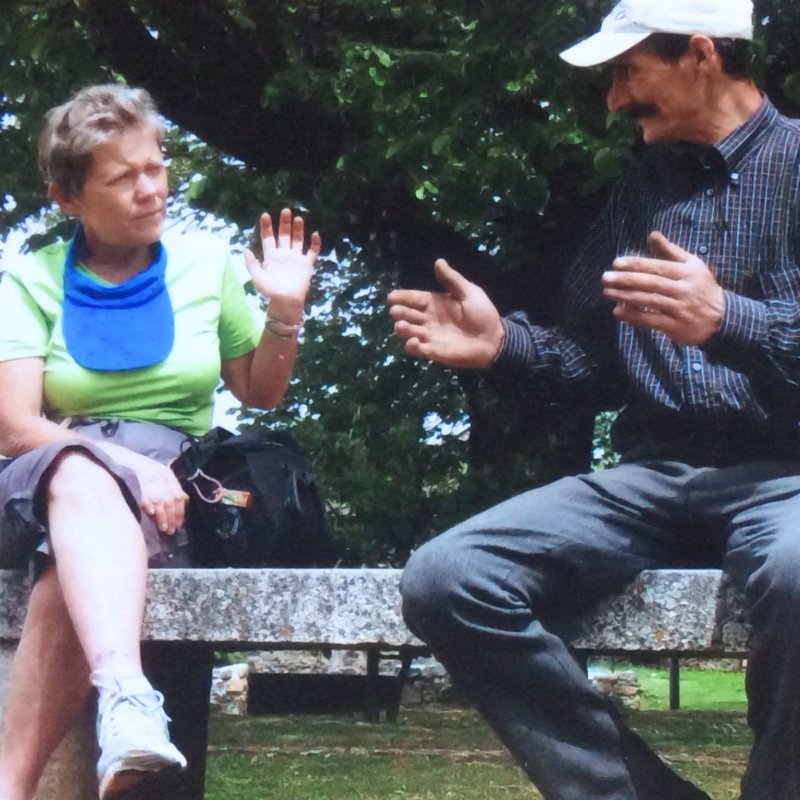
Barry Evans
It’s imperative to feel comfortable and safe while traveling. Medjet provides premier air medical transport and travel protection, providing peace of mind for an affordable price.
Traveling seems to be in my bones. Not only was I born in a car, but my father worked for the U.S. State Department, so my family moved from country to country every few years. I met Barry, my husband, in my 20s, and 40 years later, we’re still traveling.
Videos by TravelAwaits
But we’re unusual among Americans. Many people we know traveled abroad briefly after college, and then, around age 22, stopped, except for an occasional tour or cruise in their retirement years.
This isn’t the case in other Western countries. While 42 percent of Americans hold passports, 66 percent of Canadians had a passport in 2016, and 76 percent of people in England and Wales have one.
Based on my experience and observations, here are seven fears that hold people back.
1. Fear Of Being Robbed
Barry has a philosophy that you should be prepared to lose $100 your first 48 hours in a new place, due to disorientation, jet lag, and confusion. And I’m afraid he bases that on firsthand experience! It’s happened to us more than once, especially during the first hours after arrival.
A few years ago, on the commuter train from the Charles de Gaulle airport to Paris, a couple of young guys asked us to sign a petition. As we were distracted, explaining that we weren’t French, their partner was rummaging through our bike panniers behind our backs, running off with a camera. Boy, did we feel stupid!
Here are some simple but often overlooked tips for keeping your valuables safe:
Pack Lightly
The less you carry, the more you can focus on your valuables.
Aim To Look Like A Local
Avoid wearing flashy jewelry or expensive clothes, which could make you a target. Keep your phone safely within a pocket or bag, out of sight. Don’t call attention to yourself by speaking English loudly.
Carry Limited Cash
You can always get more at an ATM. (I prefer using cash abroad, just in case my credit card is stolen. To make sure your card is accepted, call the company before you leave the U.S. to let them know where you’ll be traveling).
Leave Your Passport At Your Hotel
Make a copy of the page in your passport with your photo and ID and keep it in a separate place.
Pay Special Attention When You’re In Transition And Motion
Do as we say, not as we do! When you’re getting on a bus or train — arriving or departing — is when you’re distracted by logistics and are most susceptible to being robbed.
2. Fear Of Being Attacked
It doesn’t matter where we go, people inevitably ask, “Will you be safe?” Sad to say, I’m safer in many countries than I am on a lot of streets in the U.S. In all our years of travel, neither Barry nor I have ever been mugged or attacked. Nor have we met anyone who has been.
You can gauge the safety of a country by doing research before you leave. Check the U.S. State Department advisories, which alert you to areas of a country that are unsafe to visit. These can be helpful, but in my opinion, they err on the side of caution. Well, of course. That’s their job — to protect U.S. citizens. We have visited countries like Colombia, Turkey, and of course, Mexico, which from time to time the advisories warn against. I’d bear them in mind, but also browse the web for expat chat groups or local English-language Facebook groups where you can ask people on the ground — the real experts — for current information.
3. Fear Of Getting Sick From Food
While it’s no fun getting sick, it’s usually avoidable. Educate yourself about where you’re going. Is it safe to drink the water? Are there certain foods to avoid?
Street food can be delicious, but if you’re not sure about it, ask the hotel staff and watch where locals go. Long lines not only attest to the quality but often to the safety of the food, too.
4. Fear Of An Injury Or A Serious Health Issue
You can always buy international health insurance; several options are reviewed here. But even without it, your costs for health care in another country will probably be much less than you expect.
After Barry fell on a slippery rocky path when we were hiking in England, he had his wounds stitched at the local hospital. Cost: Zero.
A few years later, I fell off my bike in France and fractured my finger. I went to the local clinic twice to have it treated. Cost: 100 euros, about $125.
A friend needed pins removed after elbow surgery. She had heard of Medical Tourism, a site that connects users with surgeons and other healthcare providers in international destinations. Their services are a fraction of the cost they would be in the States. She ended up going to Baja, getting excellent care, and meanwhile renting a cabana and enjoying a beach vacation with her beloved.
Where I live in Mexico, expats routinely get cataract surgery, colonoscopies, and root canals. The reality is you can get affordable, excellent health care in most parts of the world. In terms of cost, the U.S. is an outlier, not the norm.
5. Fear Of Not Being Understood
A friendly attitude is more important than language skills, in my opinion. After spending years struggling with Spanish, Barry finally decided that the anxiety he felt trying to master the language was not worth the results. He enjoys our life in Mexico much more now. The funny thing is, Mexicans love him and can often understand him because he’s more relaxed.
A little goes a long way. Even learning to say “Good morning,” “Good evening,” “Please,” and “Thank you” in the language of the country you’re visiting will engender a sense of appreciation in your listener. I am embarrassed when I hear English-language speakers in a Mexican restaurant who won’t even say gracias.
If you speak a foreign language somewhat, one trick I’ve found is to look for other people for whom it is also a second language. One day during the economic crisis of 2008, for example, Barry and I were bicycling along the Spain-Portugal border, where we dipped into Portugal for a few hours. In a park, we met a Portuguese guy who told us all about his experience of la crisis in Spanish. Because he spoke slowly, it was much easier to understand him than it was to understand the native Spanish speakers just over the border!
6. Fear Of Getting Lost
If you’re afraid of getting lost, buy a local map, or use GPS. Or try my method of walking two square blocks in each direction of where you’re staying so you become familiar with the local landmarks.
Not knowing where you are is an ideal time to ask for help. Just be sure to first say “Good morning” or “Excuse me?” It sounds obvious, but in many cultures, simple courtesies are very important, and you don’t want to come across as brusque.
7. Fear Of Loneliness
I find loneliness to be a normal part of travel, just as it is of life. A good book or a compelling film are great distractions.
It helps to be comfortable enjoying your own company. Years ago a friend and I, both exchange students at the University of Wales, were all set to go to a movie after eating fish and chips. At the last moment, she changed her mind. “But what about me?” I said.
“Go anyway,” she said. “It’s no big deal.” So, reluctantly, I did. And she was right — I thoroughly enjoyed the movie, and realized I didn’t need a companion to have a good time.
While travel fears are real and shouldn’t be ignored, the benefits far outweigh them. Mark Twain put it best: “Travel is fatal to prejudice, bigotry, and narrow-mindedness.” When we meet people from other cultures, when we eat, laugh, and enjoy life together, we form lasting friendships and make the world a better place.
